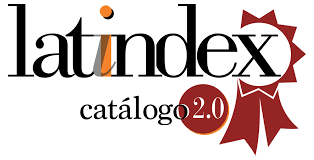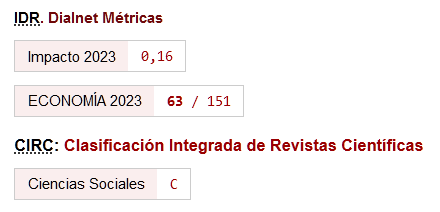Factores de gestión del conocimiento en entidad pública del sector de tránsito y transporte
DOI:
https://doi.org/10.46661/revmetodoscuanteconempresa.4563Palabras clave:
gestión del conocimiento, modelos, tecnología, toma de decisionesResumen
Desde una visión sistémica la gestión del conocimiento afecta al proceso de toma de decisiones en las organizaciones que, en un entorno globalizado, deben plantear estrategias que posibiliten el incremento de la competitividad y productividad. El objetivo es determinar los factores de gestión de conocimiento (GC) en una entidad pública del sector transporte en Colombia que optimizan la prestación de sus servicios, ofreciendo herramientas que facilitan la captura, creación, retención, difusión y uso del conocimiento, tomando como referencia, el análisis relacional de cuatro factores como lo son el manejo de información, la planeación estratégica, la comunicación e incentivos y la gestión tecnológica.
La investigación es de enfoque cuantitativo, con un alcance correlacional y diseño no experimental de tipo transversal. En el análisis de los datos se aplicaron técnicas estadísticas multivariadas. Se realizó un análisis correlacional a través del cálculo del coeficiente de correlación de Sperman, para establecer cómo son las relaciones entre las dimensiones de los factores estudiados y entre cada factor. Luego se validan los factores mediante un analisis de ecuaciones estructurales con estimaciones de máxima verosimilitud. Dentro de los hallazgos destaca que no existe una asociación entre el manejo de información y la gestión tecnológica, lo que limita la gestión del conocimiento organizacional, pero a su vez constituye una oportunidad de mejora para la efectiva ejecución futura de los procesos.
Descargas
Citas
Acosta-Prado, J.C., Romero-Severiche, A.K., & Tafur-Mendoza, A.A. (2020a). Conditions of knowledge management, innovation capability and firm performance in Colombian NTBFs: A measurement scale. VINE Journal of Information and Knowledge Management Systems. https://doi.org/10.1108/VJIKMS-09-2019-0142
Acosta-Prado, J.C., Franco, J.F., & Tafur-Mendoza, A.A. (2020b). Relationship between conditions of knowledge management and innovation capability in new technology-based firms. International Journal of Innovation Management, 2150005. https://doi.org/10.1142/S1363919621500055
Al Yami, M., & Ajmal, M.M. (2019). Pursuing sustainable development with knowledge management in public sector. VINE Journal of Information and Knowledge Management Systems, 49(4), 568-593. https://doi.org/10.1108/VJIKMS-05-2019-0068
Al Zoubi, M. (2020). The role of factors in enhancing the practices of knowledge management in public and private business organizations in Jordan. Test Engineering and Management, 83, 743-755. https://www.scopus.com/inward/record.uri?eid=2-s2.0-85082758864&partnerID=40&md5=d570082aa269257c6f3314330aeb9cb8
Amayah, A.T. (2013). Determinants of knowledge sharing in a public sector organization. Journal of Knowledge Management, 17(3), 454-471. https://doi.org/10.1108/JKM-11-2012-0369
Angulo, R. (2017). Gestión del conocimiento y aprendizaje organizacional: una visión integral. Informes Psicológicos, 17(1), 53-70. http://dx.doi.org/10.18566/infpsic.v17n1a03
Bagozzi, R.P., & Yi, Y. (2012). Specification, evaluation, and interpretation of structural equation models. Journal of the academy of marketing science, 40(1), 8-34. https://doi.org/10.1007/s11747-011-0278-x
Balasubramanian, S., Al-Ahbabi, S., & Sreejith, S. (2019). Knowledge management processes and performance: The impact of ownership of public sector organizations. International Journal of Public Sector Management, 33(1), 1-21. https://doi.org/10.1108/IJPSM-05-2019-0131
Bentler, P.M., & Bonett, D.G. (1980). Significance tests and goodness of fit in the analysis of covariance structures. Psychological bulletin, 88(3), 588-606. https://doi.org/10.1037/0033-2909.88.3.588
Bindé, J. (2005). Hacia las sociedades del conocimiento: informe mundial de la UNESCO. Mayenne (France): Jouve.
Blackman, D., Kennedy, M., Burford, S., & Ferguson, S. (2013). Introduction to the special symposium on knowledge management and public administration: Good bedfellows or potential sparring partners. International Journal of Public Administration, 36(3), 151-154. https://doi.org/10.1080/01900692.2012.749276
Castañeda, D., & Pérez, A. (2005). ¿Cómo se produce el aprendizaje individual en el aprendizaje organizacional? Una explicación más allá del proceso de intuir. Revista Interamericana de Psicología Ocupacional, 24, 1-15. http://revista.cincel.com.co/index.php/RPO/article/view/59
Castillo, A. Velandia, Hernández, P. Archibold, W. (2017) Knowledge management and innovation in SME exporting industrial sector of Colombia. Colombia: Revista Espacios, 38(34). https://www.revistaespacios.com/a17v38n34/17383424.html
Contreras F. & Tito P. (2013). La gestión del conocimiento y las políticas públicas (Primera Edición). Perú: Universidad María Auxiliadora.
Currie, G., Waring, J., & Finn, R. (2008). The limits of knowledge management for UK public services modernization: The case of patient safety and service quality. Public Administration, 86(2), 363-385. https://doi.org/10.1111/j.1467-9299.2007.00705.x
De la Hoz, E., Orozco, E. & Martínez, D. (2018). Diseño de un modelo de factores clave de capacidad logística para las pequeñas y medianas empresas del sector de confecciones de Cartagena, Colombia. Interciencia: Revista de ciencia y tecnología de América, 43(3), 215- 218. https://www.redalyc.org/jatsRepo/339/33957185011/33957185011.pdf
Díaz, L., & Morales, M. (2012). Análisis estadístico de datos multivariados. Bogotá: Universidad Nacional de Colombia.
Echeverri, A., Lozada, N., & Arias, J.E. (2018). Incidencia de las Prácticas de Gestión del Conocimiento sobre la Creatividad Organizacional. Información Tecnológica, 29(1), 71-82. https://doi.org/10.4067/s0718-07642018000100071
Fábregas, F.D., Ardura, I.R., & Artola, A.M. (2018). Modelos de ecuaciones estructurales en investigaciones de ciencias sociales: experiencia de uso en Facebook. Revista de Ciencias Sociales, 24(1), 22-40.
Fernández, M., & Ponjuán, G. (2008). Análisis conceptual de las principales interacciones entre la gestión de información, la gestión documental y la gestión del conocimiento. ACIMED, 18(1) Recuperado el 21 de enero de 2020, de http://scielo.sld.cu/scielo.php?script=sci_arttext&pid=S1024- 94352008000700007&lng=es&tlng=es.
Fierro, E., Martínez, M., & García, R. (2018). Can gender be a determinant of organizational performance and knowledge sharing in public sector organizations? AD-Minister, 32, 137-158. https://doi.org/10.17230/ad-minister.32.6
Fontalvo, J., Quejada, R., & Puello, J., (2011) La Gestión del conocimiento y los procesos de mejoramiento. Publicación Dimensión Empresarial, 9(1) 80-87. Recuperado de https://dialnet.unirioja.es/descarga/articulo/3797779.pdf
Garzón, M., & Fischer, A. (2010). El aprendizaje organizacional, prueba piloto de instrumentos tipo Likert. Fórum Empresarial, 15(1), 65-101. https://doi.org/10.33801/fe.v15i1.3417.
Gutiérrez, A., Miranda, Y., Ortiz, L., Castañeda, J., Reyes, D., & Key, J. (2017). Innovación empresarial: análisis de cinco empresas farmacéuticas de Barranquilla-Colombia. Revista Espacios, 38(54), 16-30. https://www.revistaespacios.com/a17v38n54/a17v38n54p16.pdf
Handzic, M. (2011). Integrated socio-technical knowledge management model: An empirical evaluation. Journal of Knowledge Management, 15(2), 198-211. https://doi.org/10.1108/13673271111119655
Hernández (2010). Metodología de la Investigación (Quinta Ed.), México: McGraw Hill Interamericana Editores S.A.
Llinás, H. (2018). Estadística inferencial. Barranquilla: Universidad del Norte.
Muniz, J., Hong, J., Oliveira, S., Wintersberger, D., & Popadiuk, S. (2019). Knowledge sharing in the automotive sector: a comparative study of chinese and brazilian firms. Production, 29, 1-21. https://doi.org/10.1590/0103-6513.20180084
Nonaka, I. & Takeuchi, H. (1999). La Organización creadora del conocimiento (original en inglés: The knowledge - creating company, 1995). México: Oxford University Press.
Ortiz-Ospino, L.E., Orozco-Acosta, E., Quintero-Castro, R., & Orellano-Robles, J. (2017). Modelo de gestión del conocimiento para la dinamización de la competitividad: estudio medianas empresas afiliadas a ACOPI Atlántico, Colombia. Revista Espacios, 38(46), 2-15. http://hdl.handle.net/20.500.12442/1746
Pee, L.G., & Kankanhalli, A. (2016). Interactions among factors influencing knowledge management in public-sector organizations: A resource-based view. Government Information Quarterly, 33(1), 188-199. http://dx.doi.org/10.1016/j.giq.2015.06.002
Pertuz, V., & Pérez, A. (2020). Innovation management practices: review and guidance for future research in SMEs. Management Review Quarterly, 71, 177-213. https://doi.org/10.1007/s11301-020-00183-9
Razzaq, S., Shujahat, M., Hussain, S., Nawaz, F., Wang, M., Ali, M., & Tehseen, S. (2019). Knowledge management, organizational commitment and knowledge-worker performance: The neglected role of knowledge management in the public sector. Business Process Management Journal, 25(5), 923-947. https://doi.org/10.1108/BPMJ-03-2018-0079
Sanz, S. (2005). Comunidades de práctica virtuales: acceso y uso de contenidos. RUSC. Universities and Knowledge Society Journal, 2, 26-35. http://www.redalyc.org/articulo.oa?id=78020110
Seba, I., Rowley, J., & Delbridge, R. (2012). Knowledge sharing in the Dubai police force. Journal of Knowledge Management, 16(1), 114-128. https://doi.org/10.1108/13673271211198972
Syed-Ikhsan, S.O.S., & Rowland, F. (2004). Knowledge management in a public organization: A study on the relationship between organizational elements and the performance of knowledge transfer. Journal of Knowledge Management, 8(2), 95-111. https://doi.org/10.1108/13673270410529145
Tan, C.N.L., & Ramayah, T. (2018). Exploring the individual, social and organizational predictors of knowledge-sharing behaviours among communities of practice of SMEs in Malaysia. Journal of Systems and Information Technology, 20(3), 375-399. https://doi.org/10.1108/JSIT-09-2017-0071
Valdés, L. (2004). Innovación: el arte de inventar el futuro. Bogotá: Editorial Norma.
Valle, A., Puerta, A., & Nuñez, R. (2015). Curso de consultoría TIC. Gestión, Software ERP y CRM. IT Campus Academy.
Vyas, A., Bhalla, P., & Najneen, A. (2020). Competitive analysis of interaction between organizational culture and knowledge management in indian higher education institutions: Public and private sector. International Journal of Advanced Science and Technology, 29(5), 5313-5322. https://www.scopus.com/inward/record.uri?eid=2-s2.0-85084668069&partnerID=40&md5=7de85b0a893aec443ce175cb9d41c5bf
Yap, J.B., & Toh, H. (2020). Investigating the principal factors impacting knowledge management implementation in construction organisations. Journal of Engineering, Design and Technology, 18(1), 55-69. https://doi.org/10.1108/JEDT-03-2019-0069
Zabaleta, M.I., Brito, L.E., & Garzón, M.A. (2016). Modelo de gestión del conocimiento en el área de TIC para una universidad del caribe colombiano. Revista Lasallista de investigación, 13(2), 136-150. https://doi.org/10.22507/rli.v13n2a13
Publicado
Cómo citar
Número
Sección
Licencia

Esta obra está bajo una licencia internacional Creative Commons Atribución-CompartirIgual 4.0.
El envío de un manuscrito a la Revista supone que el trabajo no ha sido publicado anteriormente (excepto en la forma de un abstract o como parte de una tesis), que no está bajo consideración para su publicación en ninguna otra revista o editorial y que, en caso de aceptación, los autores están conforme con la transferencia automática del copyright a la Revista para su publicación y difusión. Los autores retendrán los derechos de autor para usar y compartir su artículo con un uso personal, institucional o con fines docentes; igualmente retiene los derechos de patente, de marca registrada (en caso de que sean aplicables) o derechos morales de autor (incluyendo los datos de investigación).
Los artículos publicados en la Revista están sujetos a la licencia Creative Commons CC-BY-SA de tipo Reconocimiento-CompartirIgual. Se permite el uso comercial de la obra, reconociendo su autoría, y de las posibles obras derivadas, la distribución de las cuales se debe hacer con una licencia igual a la que regula la obra original.
Hasta el volumen 21 se ha estado empleando la versión de licencia CC-BY-SA 3.0 ES y se ha comenzado a usar la versión CC-BY-SA 4.0 desde el volumen 22.










